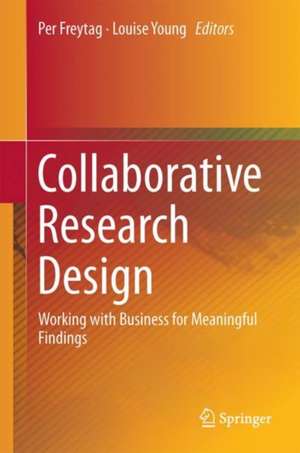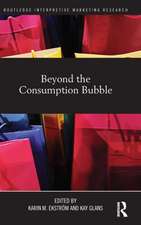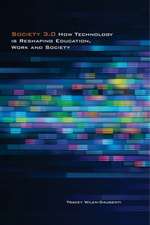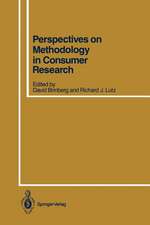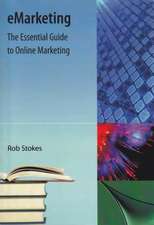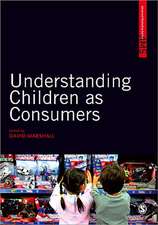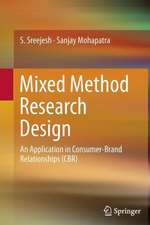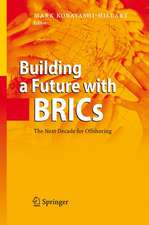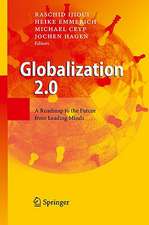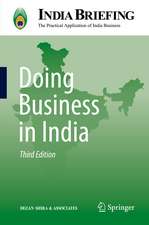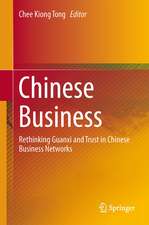Collaborative Research Design: Working with Business for Meaningful Findings
Editat de Per Vagn Freytag, Louise Youngen Limba Engleză Hardback – 11 oct 2017
Finally, the book provides a link between the philosophical underpinnings of research and the different research methods presented. This is often neglected but undertaking the knowledge-generating journey that is research includes having a view on reality and marrying this to beliefs about how the reality to be investigated can be best expedited.
| Toate formatele și edițiile | Preț | Express |
|---|---|---|
| Paperback (1) | 991.08 lei 3-5 săpt. | |
| Springer Nature Singapore – 29 dec 2018 | 991.08 lei 3-5 săpt. | |
| Hardback (1) | 861.15 lei 38-45 zile | |
| Springer Nature Singapore – 11 oct 2017 | 861.15 lei 38-45 zile |
Preț: 861.15 lei
Preț vechi: 1133.09 lei
-24% Nou
Puncte Express: 1292
Preț estimativ în valută:
164.88€ • 171.69$ • 136.80£
164.88€ • 171.69$ • 136.80£
Carte tipărită la comandă
Livrare economică 10-17 februarie
Preluare comenzi: 021 569.72.76
Specificații
ISBN-13: 9789811050060
ISBN-10: 9811050066
Pagini: 384
Ilustrații: VIII, 428 p. 49 illus., 36 illus. in color.
Dimensiuni: 155 x 235 x 24 mm
Greutate: 0.86 kg
Ediția:1st ed. 2018
Editura: Springer Nature Singapore
Colecția Springer
Locul publicării:Singapore, Singapore
ISBN-10: 9811050066
Pagini: 384
Ilustrații: VIII, 428 p. 49 illus., 36 illus. in color.
Dimensiuni: 155 x 235 x 24 mm
Greutate: 0.86 kg
Ediția:1st ed. 2018
Editura: Springer Nature Singapore
Colecția Springer
Locul publicării:Singapore, Singapore
Cuprins
Preface.- Introduction.- Part 1 - Frameworks for Conceptualizing and Designing Research.- Chapter 1 - An Abductive Non-Linear Framework for Undertaking Conceptual and Empirical Research within a Critical Realist Perspective.- Chapter 2 - Abduction: Theory and Practice.- Chapter 3 - Understanding the Process of Empirical Business Studies: The Influence of Methodological Approaches.- Chapter 4 - The Palette of Different Literature Reviews.- Part 2 - Methods for Research Design and Information Capture.- Chapter 5 - Using Workshops in Business Research: A Framework to Diagnose, Plan, Facilitate and Analyse Workshops.- Chapter 6 - Looking at Talking Pictures of Business Relationships: Images of Methodology .- Chapter 7 - Multiple Multi-Method Systematic Observation: Theory and Practice.- Chapter 8 - Interviewing Like a Researcher: The Powers of Paradigms.- Chapter 9 - The Use of Experiments in Business Studies.- Part 3 - Transformation, Analysis and Interpretation of Information.- Chapter 10 - Assessing Quality of Qualitative and Case Study Research.- Chapter 11 - Tangible Models of Business.- Chapter 12 - Technological Advances in Communicating Research, Data Analysis and Displays .- Chapter 13 - Automated Semantic Analysis of Qualitative Marketing Data.- Part 4 - The Way Forward - Methods for Future Development of Research.- Chapter 14 - A Critical-Theoretical Approach to Studying Power Relations Through Vignettes.- Chapter 15 - Improvising in Research - Drawing on Theater Practices.- Chapter 16 - Agent-Based Simulation Models as a Research Method.
Notă biografică
Per Vagn Freytag is Professor of Marketing at the University of Southern Denmark. His main area of research is business-to-business marketing, specifically segmentation and portfolio planning, with a focus on dyads and understanding collaboration between firms. Throughout his career he has been heavily involved in substantial knowledge-sharing and collaboration activities between universities and public and private firms.
Louise Young is Emeritus Professor of Marketing at the University of Western Sydney and Visiting Professor of Marketing at the University of Southern Denmark. Her main focus is business-to-business marketing and is widely known for her work on trust and cooperation in business relationships. She has also worked in the areas of innovation in networks, idea and resource innovation, the industrial selling process, relationship building through professional networking, alienation in channels of distribution and relational commitment.
;Textul de pe ultima copertă
This book articulates and interconnects a range of research methods for the investigation of business management processes. It introduces new directions that both recognise the business community as stakeholders in the research process and seek to include them in that process. The book presents a range of contemporary research methods with particular focus on those that allow insights into business managers’ thoughts and behaviours. It includes fresh views on traditional research designs, for example new approaches to using literature reviews, experiments, interviews and observation studies. It also considers cutting-edge research methods, such as the use of vignettes, workshops, improvisation and theatre, as well as computer-based simulation. In addition to discussing new approaches to data capture and data generation, it presents new methods of data analysis by considering various forms of models and modelling, new forms of computer-aided text analysis and innovative approaches todata display.
Finally, the book provides a link between the philosophical underpinnings of research and the different research methods presented. This is often neglected but undertaking the knowledge-generating journey that is research includes having a view on reality and marrying this to beliefs about how the reality to be investigated can be best expedited.
Finally, the book provides a link between the philosophical underpinnings of research and the different research methods presented. This is often neglected but undertaking the knowledge-generating journey that is research includes having a view on reality and marrying this to beliefs about how the reality to be investigated can be best expedited.
Caracteristici
Presents a range of contemporary research methods that allow insights into the thoughts and behaviors of business managers Offers cutting-edge research methods as well as new twists on traditional research designs Provides new directions for research that recognise the business community as stakeholders and seek to include them in the research process Includes supplementary material: sn.pub/extras
